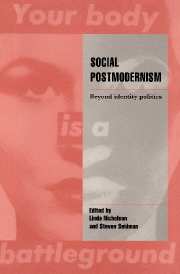Book contents
- Frontmatter
- Contents
- Notes on contributors
- Acknowledgements
- Introduction
- Part I Critiques of identity
- Part II Critiques of the deconstruction of identity
- Part III Postmodern approaches to the social
- 7 Gender as seriality: thinking about women as a social collective
- 8 Refiguring social space
- 9 Just framing: ethnicities and racisms in a “postmodern” framework
- 10 Politics, culture, and the public sphere: toward a postmodern conception
- Part IV Postmodern approaches to the political
10 - Politics, culture, and the public sphere: toward a postmodern conception
Published online by Cambridge University Press: 29 October 2009
- Frontmatter
- Contents
- Notes on contributors
- Acknowledgements
- Introduction
- Part I Critiques of identity
- Part II Critiques of the deconstruction of identity
- Part III Postmodern approaches to the social
- 7 Gender as seriality: thinking about women as a social collective
- 8 Refiguring social space
- 9 Just framing: ethnicities and racisms in a “postmodern” framework
- 10 Politics, culture, and the public sphere: toward a postmodern conception
- Part IV Postmodern approaches to the political
Summary
Recent years have seen a burgeoning of interest in the United States of the concept of the public sphere. This concept finds its most sophisticated theoretical elaboration in Jürgen Habermas's 1962 book, The Structural Transformation of the Public Sphere. In fact, it was the belated publication of an English translation of this book in 1989 that sparked the current revival of interest in this topic (Habermas 1989).
This revival is in my view quite salutary. The idea of the public sphere is a valuable conceptual resource for contemporary critical theory. It designates a theatre in modern societies in which political participation is enacted through the medium of talk. It is the space in which citizens deliberate about their common affairs, hence, an institutionalized arena of discursive interaction. This arena is conceptually distinct from the state; it a site for the production and circulation of discourses that can in principle be critical of the state. The public sphere in this sense is also conceptually distinct from the official economy; it is not an arena of market relations but rather one of discursive relations, a theatre for debating and deliberating rather than for buying and selling. Thus, this concept of the public sphere permits us to keep in view distinctions between state apparatuses, economic markets, and democratic associations. Such distinctions are essential to democratic theory. They are especially important today, when “democracy” has once again become a keyword of political life, invoked to justify various postcommunist scenarios, even as its meaning is hotly contested.
If the idea of the public sphere is an indispensable resource for the political theory of contemporary democracy, it is no less important for contemporary cultural critique.
- Type
- Chapter
- Information
- Social PostmodernismBeyond Identity Politics, pp. 287 - 312Publisher: Cambridge University PressPrint publication year: 1995
- 73
- Cited by



